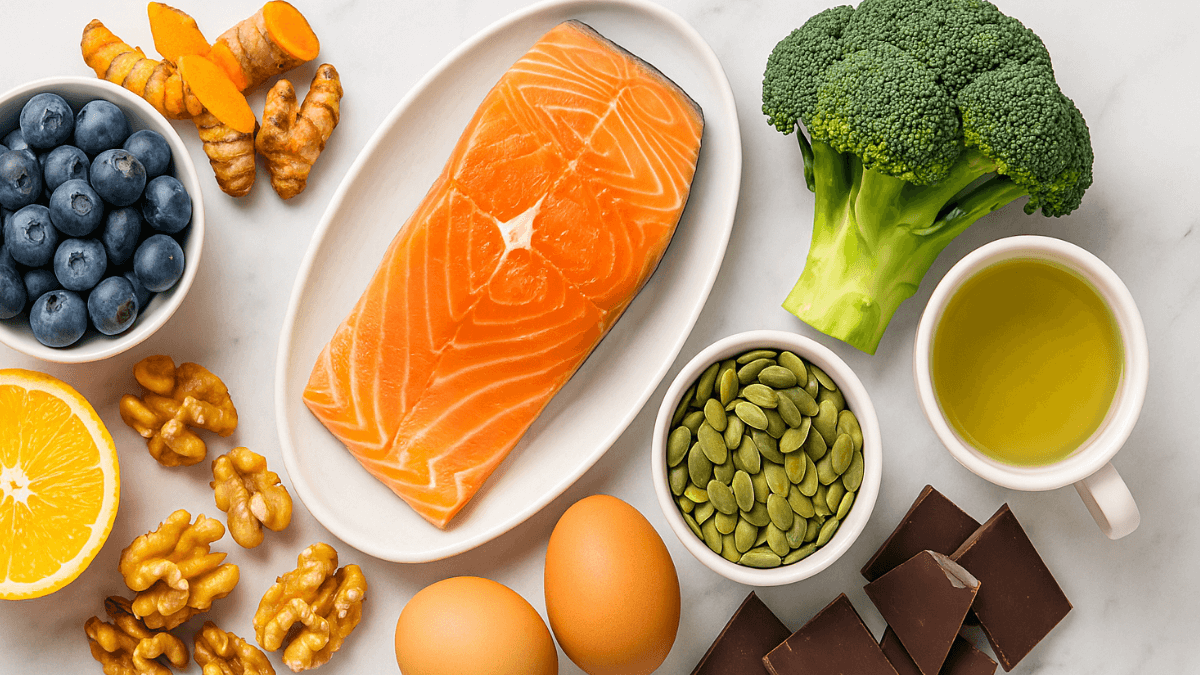The Top 10 Brain-Boosting Foods You Should Be Eating Every Week
We’ve all heard the adage, “you are what you eat.” While it’s often associated with physical health and body composition, nowhere is this statement more profoundly true than in the intricate, high-energy world of your brain. The food you consume provides the essential raw materials—the fats, proteins, vitamins, and antioxidants—that build your brain cells, fuel your neurotransmitters, and protect you from cognitive decline.
In my decade of researching cognitive performance, I’ve seen countless people search for a “magic pill” supplement while completely ignoring the most powerful nootropic of all: their daily diet. You simply cannot out-supplement a poor nutritional foundation. The right foods can enhance your focus, sharpen your memory, and clear away brain fog, while the wrong ones can actively promote inflammation and mental fatigue.
Think of this guide not as a restrictive diet plan, but as a strategic upgrade for your brain’s pantry. We are going to move beyond generic advice and dive deep into the science of neuro-nutrition. We will explore the top 10 brain-boosting foods, explain the specific compounds that make them so powerful, and provide practical ways to incorporate them into your weekly routine. Your journey to a sharper, more resilient mind starts on your plate.
1. Fatty Fish (The Ultimate Brain Fat)
At the top of any list of brain-healthy foods, you will invariably find fatty, cold-water fish. This is for one primary reason: Omega-3 fatty acids. Your brain is composed of nearly 60% fat, and a massive portion of that fat is an omega-3 called DHA (docosahexaenoic acid). DHA is a critical structural component of your brain cell membranes and the cerebral cortex, the region responsible for higher-order functions like memory, language, and creativity.
Think of DHA as the high-quality, flexible material that makes up the walls of your brain’s communication centers. When these walls are supple and healthy, electrical signals can pass between neurons quickly and efficiently. When you’re deficient in DHA, your body uses less optimal fats to build these membranes, resulting in stiffer, less efficient cells, which can lead to slower cognitive processing and impaired learning.
The other key omega-3, EPA (eicosapentaenoic acid), is a powerful anti-inflammatory agent. Chronic inflammation in the brain is a key driver of brain fog, mental fatigue, and long-term neurodegenerative issues. EPA helps to quell this inflammation, creating a healthier environment for your brain to operate in.
- Key Nutrients: DHA, EPA (Omega-3s), Vitamin D.
- Best Sources: Prioritize wild-caught, low-mercury options like salmon, mackerel, anchovies, sardines, and herring (remember the acronym SMASH).
- How to Incorporate: Aim to eat a 3-4 ounce serving of fatty fish at least twice per week. A simple baked salmon with vegetables or sardines mashed with avocado on whole-grain toast are excellent, easy options.
2. Blueberries (The Antioxidant Powerhouse)
Blueberries are consistently lauded as one of the most powerful foods for the brain, and for good reason. Their deep blue and purple hues are the result of a class of compounds called anthocyanins, which belong to a larger group known as flavonoids. These flavonoids are where the magic happens.
Anthocyanins are potent antioxidants that can cross the blood-brain barrier, allowing them to exert their protective effects directly within the brain. Their primary role is to combat oxidative stress. Throughout the day, your brain’s high metabolic activity produces unstable molecules called free radicals. If left unchecked, these free radicals can damage your brain cells, leading to inflammation and accelerated cognitive aging. The antioxidants in blueberries act like a cleanup crew, neutralizing these harmful free radicals.
Furthermore, studies suggest that these compounds have more direct nootropic effects. They appear to improve communication between brain cells and stimulate neurogenesis, particularly in the hippocampus, the brain’s primary memory center. This dual action of both protecting existing neurons and promoting the growth of new ones makes blueberries a true superfood for both immediate clarity and long-term brain health.
- Key Nutrients: Anthocyanins, Flavonoids, Vitamin C, Vitamin K.
- Best Sources: Wild blueberries are smaller and have a higher concentration of anthocyanins, but all varieties are excellent.
- How to Incorporate: Aim for a half-cup serving 3-5 times per week. They are perfect for adding to smoothies, oatmeal, yogurt, or simply eating by the handful as a snack.
3. Leafy Greens (The Brain’s Protector)
Dark leafy greens like kale, spinach, collards, and Swiss chard are nutritional powerhouses packed with a host of brain-essential nutrients. They are one of the most nutrient-dense food groups you can consume, offering a wide array of vitamins, minerals, and bioactive compounds.
One of their standout nutrients is Vitamin K, which is essential for the formation of sphingolipids, a type of fat that is densely packed into brain cell membranes and is crucial for their structure and function. They are also rich in lutein, a carotenoid that has been shown to accumulate in the brain and is associated with preserving cognitive function over the lifespan.
Furthermore, leafy greens are a fantastic source of folate (Vitamin B9). Folate is critical for neurotransmitter synthesis and for regulating homocysteine levels in the blood. High levels of homocysteine are a known risk factor for cognitive decline and vascular issues in the brain. The powerful combination of antioxidants like beta-carotene, combined with these essential vitamins, makes leafy greens a cornerstone of any diet focused on long-term brain protection.
- Key Nutrients: Vitamin K, Lutein, Folate (B9), Beta-carotene.
- Best Sources: Kale, spinach, Swiss chard, collard greens, arugula.
- How to Incorporate: Be ambitious here. Aim for at least one to two servings every single day. A simple way to achieve this is to add a large handful of spinach to your morning smoothie (you won’t even taste it), have a large salad for lunch, or serve your dinner over a bed of wilted kale.
4. Walnuts (The Plant-Based Omega-3)
If fatty fish are the kings of animal-based omega-3s, walnuts are the champions of the plant kingdom. They are a rich source of a plant-based omega-3 called alpha-linolenic acid (ALA). Your body can convert ALA into the more powerful EPA and DHA, although the conversion process is not perfectly efficient. Nonetheless, a consistent intake of ALA is a significant contributor to overall brain health.
Beyond their healthy fats, walnuts are packed with a synergistic blend of other neuroprotective compounds. They contain high levels of antioxidants, including Vitamin E and polyphenols, which help combat oxidative stress. This combination of healthy fats and powerful antioxidants has been shown in studies to improve performance on cognitive tests, including those measuring memory, concentration, and information processing speed.
The unique shape of a walnut, resembling a tiny brain, is a classic example of the “doctrine of signatures”—an ancient idea that herbs and foods often resemble the body parts they are meant to heal. In the case of the walnut, modern science has proven this ancient observation to be remarkably accurate.
- Key Nutrients: Alpha-Linolenic Acid (ALA), Vitamin E, Polyphenols.
- Best Sources: Raw, unsalted walnuts.
- How to Incorporate: A small handful (about 1/4 cup) 4-5 times per week is a great target. They make an excellent snack, a crunchy topping for oatmeal or yogurt, or a great addition to salads.
5. Eggs (The Choline Super-Source)
Eggs, particularly the yolks, are one of nature’s most concentrated sources of choline, a nutrient that is absolutely vital for brain function yet is often lacking in the modern diet. Choline is the direct precursor to acetylcholine, one of the most important neurotransmitters for memory and learning.
Acetylcholine acts like a master key for cognitive processing, allowing you to encode new information, maintain focus, and retrieve memories. A diet rich in choline ensures that your brain has the raw materials it needs to produce an ample supply of this critical messenger.
Furthermore, egg yolks are also a good source of several B-vitamins (B6, B12, and folate), which work together to regulate homocysteine levels and support overall brain metabolism. The combination of high-quality protein and these essential brain nutrients makes eggs a nearly perfect food for starting your day with mental clarity.
- Key Nutrients: Choline, B Vitamins, Vitamin D, High-Quality Protein.
- Best Sources: Pasture-raised eggs will have a higher concentration of beneficial nutrients.
- How to Incorporate: Including 3-5 whole eggs in your diet several times a week is a great strategy. Don’t throw away the yolk—that’s where the majority of the brain-boosting choline is found.
6. Turmeric (The Anti-Inflammatory Spice)
This vibrant yellow spice, a staple in curry powders and traditional medicine, contains a powerful active compound called curcumin. Curcumin is one of the most potent natural anti-inflammatory agents ever studied. As we’ve learned, chronic inflammation is a key enemy of a clear and focused mind.
Curcumin is able to cross the blood-brain barrier and exerts its anti-inflammatory effects directly in the brain. It works by blocking NF-kB, a molecule that turns on genes related to inflammation. Beyond its anti-inflammatory prowess, curcumin also boosts levels of the brain-hormone BDNF, which promotes the growth of new neurons and can help improve brain plasticity. Some research even suggests that curcumin may help clear the same beta-amyloid plaques associated with cognitive decline.
- Key Nutrients: Curcumin.
- Best Sources: High-quality turmeric powder or fresh turmeric root.
- How to Incorporate: Add turmeric generously to curries, soups, roasted vegetables, and even “golden milk” lattes. Crucial Tip: Curcumin is not well absorbed on its own. Always pair it with a pinch of black pepper, which contains piperine, a compound that can increase curcumin’s bioavailability by a staggering 2,000%.
7. Dark Chocolate (The Flavonoid-Rich Treat)
Good news for chocolate lovers: dark chocolate, when chosen correctly, is a potent brain food. The key lies in the cocoa bean, which is packed with a type of antioxidant called flavonoids. These compounds are particularly beneficial for the brain.
Research has shown that cocoa flavonoids accumulate in brain regions involved in learning and memory, particularly the hippocampus. They are believed to support cognitive function by increasing cerebral blood flow, delivering more oxygen and nutrients to the brain. They also have a neuroprotective effect, shielding neurons from oxidative stress.
Furthermore, cocoa contains a small amount of natural stimulants, including caffeine and theobromine, which can provide a gentle lift in alertness and mood without the intensity of a cup of coffee.
- Key Nutrients: Flavonoids, Caffeine, Theobromine, Iron, Magnesium.
- Best Sources: Choose high-quality dark chocolate with 70% cocoa content or higher. The higher the cocoa percentage, the more flavonoids and the less sugar it contains.
- How to Incorporate: A small square or two per day is a perfect way to get the benefits without overdoing the calories.
8. Avocados (The Monounsaturated Fat Fuel)
Avocados are a fantastic source of monounsaturated fats, which are crucial for supporting both cardiovascular health and brain health. These healthy fats contribute to healthy blood flow, which is essential for delivering a steady supply of oxygen to the brain.
While not as rich in omega-3s as fatty fish, the healthy fat profile of avocados helps to reduce blood pressure, a known risk factor for cognitive decline. They are also a great source of potassium, which is critical for the proper functioning of neurons. This combination makes avocados a great food for supporting the brain’s overall vascular system and ensuring it has the stable, long-lasting energy it needs.
- Key Nutrients: Monounsaturated Fats, Potassium, Vitamin K, Folate.
- Best Sources: Ripe, fresh avocados.
- How to Incorporate: Adding a quarter to a half of an avocado to your daily diet is a great goal. It’s incredibly versatile—add it to salads, smoothies, toast, or as a side to your eggs.
9. Pumpkin Seeds (The Mineral Goldmine)
Often overlooked, pumpkin seeds are a tiny but mighty source of several micronutrients that are absolutely critical for brain function. They are a true mineral goldmine.
They are an excellent source of magnesium, which is vital for learning and memory. They are packed with iron, which is essential for preventing the brain fog and fatigue associated with iron deficiency. They contain a large amount of zinc, a mineral that is crucial for nerve signaling and is found in high concentrations in the hippocampus. Finally, they are a great source of copper, which is needed to control nerve signals. A deficiency in any of these minerals can have a significant negative impact on your cognitive performance.
- Key Nutrients: Magnesium, Iron, Zinc, Copper.
- Best Sources: Raw, unsalted pumpkin seeds (also known as pepitas).
- How to Incorporate: A small handful as a snack or sprinkled over salads, oatmeal, or yogurt is a simple way to get a powerful dose of these essential brain minerals.
10. Green Tea (The Calm-Focus Beverage)
While we’ve already discussed L-Theanine as a beginner nootropic, its natural source, green tea, deserves its own spot on this list. Green tea offers a powerful synergistic combination of two key compounds: caffeine and L-theanine.
Caffeine, as we know, is a stimulant that blocks adenosine receptors to promote alertness. L-theanine, as we’ve learned, promotes a state of calm, “wakeful relaxation” by increasing alpha brain waves. When consumed together in green tea, these two compounds work in perfect harmony. The L-theanine takes the “edge” off the caffeine, smoothing out the jittery effects and preventing a harsh crash. The result is a smooth, sustained, and focused mental energy that is ideal for productive work. Green tea is also rich in polyphenols and antioxidants that help protect the brain.
- Key Nutrients: L-Theanine, Caffeine, Polyphenols (EGCG).
- Best Sources: High-quality brewed green tea, such as Sencha or Matcha.
How to Incorporate: Swapping one of your daily coffees for a cup of green tea can be a great way to get the cognitive benefits without over-stimulating your nervous system.
Frequently Asked Questions About Brain Foods
What is the single most important food for brain health?
While many foods are beneficial, fatty fish rich in Omega-3 fatty acids (specifically DHA) is often considered the most important. DHA is a primary structural component of your brain cells, and a consistent supply is crucial for long-term cognitive health and function.
How quickly can you see benefits from changing your diet?
You can often feel the negative effects of a poor meal (like a sugar crash) within hours. The positive effects of a brain-healthy diet are more cumulative. Many people report improved mental clarity and reduced brain fog within 1-2 weeks of consistently eliminating inflammatory foods and adding nutrient-dense ones.
Can I get all these brain nutrients from a multivitamin?
While a high-quality multivitamin can help fill nutritional gaps, it is not a substitute for a whole-foods diet. Foods contain a complex synergy of vitamins, minerals, fiber, and thousands of phytonutrients that work together in ways a single pill cannot replicate. It’s always best to get your primary nutrition from your plate.
Peter Benson’s Take: The Synergy of the Plate
After more than a decade of researching individual compounds and supplements, I’ve come to a firm conclusion: food synergy is more powerful than any single nutrient. While it’s fascinating to know that DHA in salmon builds cell membranes and curcumin in turmeric fights inflammation, the real magic happens when you combine these foods. A meal of baked salmon with turmeric-roasted broccoli and a large side of kale isn’t just three healthy foods; it’s a synergistic symphony of brain-boosting fats, anti-inflammatory compounds, and essential vitamins working together. Don’t get lost chasing the “one” perfect superfood. Instead, focus on building a diverse, colorful plate that incorporates several of these ingredients. A varied, nutrient-dense diet is the ultimate strategy for building a resilient and high-performance brain.
Conclusion
Building a sharper, more resilient mind doesn’t start in a supplement bottle; it starts on your plate. Your diet is the single most powerful and consistent input you give your brain every single day. By strategically incorporating these 10 powerhouse foods into your weekly routine, you are providing your brain with the essential fats, vitamins, minerals, and antioxidants it needs to fight inflammation, support clear communication between neurons, and protect itself for the long term.
You don’t need to perfectly overhaul your diet overnight. The journey to better brain health is a marathon, not a sprint. Start small. Choose just three of the foods from this list—perhaps adding fatty fish twice a week, a daily handful of walnuts, and spinach in your morning smoothie. Master these habits, and once they become effortless, incorporate a few more. This consistent, deliberate approach is the key to creating lasting changes that will fuel your cognitive performance for years to come.
Which of these brain foods is already a staple in your diet, and which one are you most excited to add? Let me know in the comments below!




